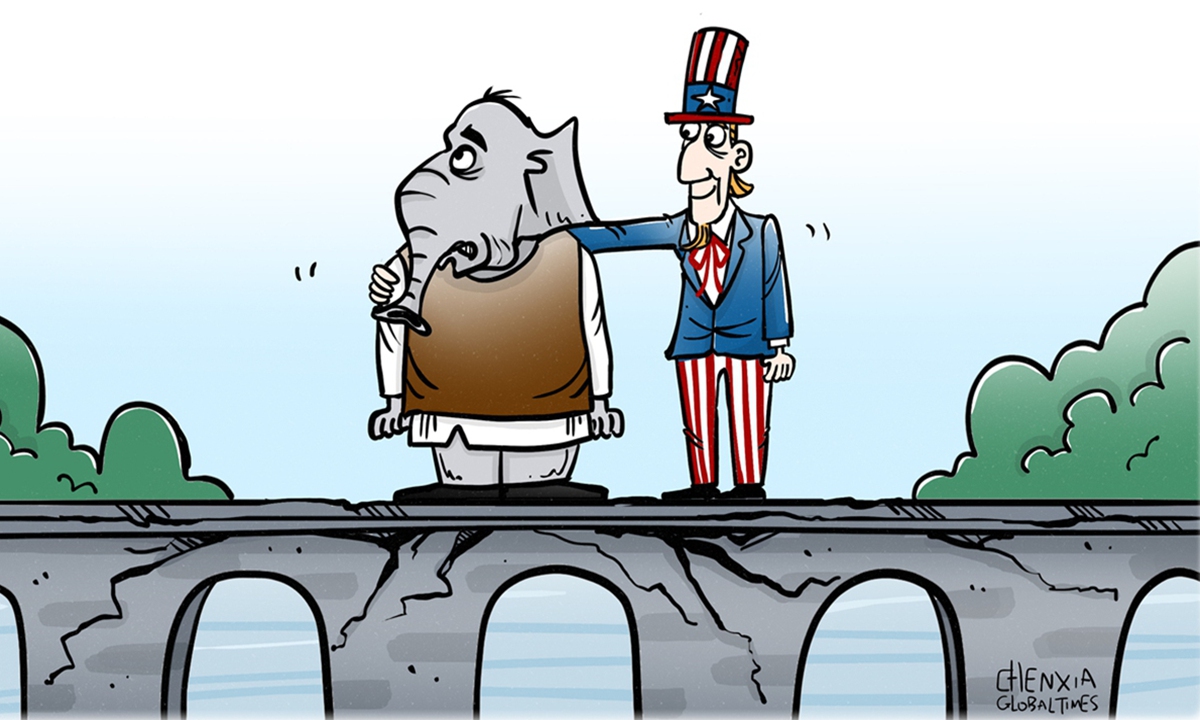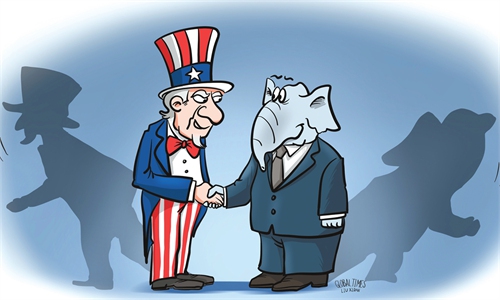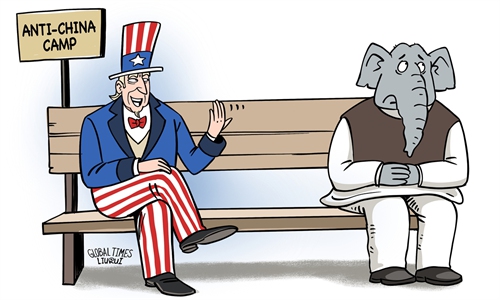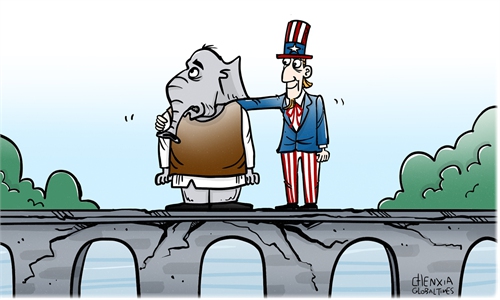
Illustration: Chen Xia/GT
US National Security Advisor Jake Sullivan recently visited India, where he met with Indian Prime Minister Narendra Modi, National Security Advisor Ajit Doval and External Affairs Minister Subrahmanyam Jaishankar. Additionally, Sullivan delivered a speech at the Indian Institute of Technology Delhi. In coverage of Sullivan's visit, some US media outlets focused on how the Joe Biden administration has continued to leverage India to contain China.
Clearly, this is a farewell visit by a senior official of the Biden administration before the transition of power. According to the White House, Sullivan's visit primarily focused on discussing a series of issues related to the US-India partnership, including cooperation on space, defense and strategic technologies, as well as shared security priorities in the "Indo-Pacific" and other regions.
Sullivan's visit, coming after Jaishankar's trip to the US in late December, underscores concerns on both sides about whether the US-India relationship can smoothly transition after the US leadership change. If Jaishankar's mission in Washington aimed to gauge the incoming US administration's stance and secure an invitation to the US President-elect Donald Trump's inauguration, Sullivan's task was to ensure that the framework of US-India cooperation established under the Biden administration could continue under the new administration. This includes ensuring the continuation of the Initiative on Critical and Emerging Technologies (iCET).
The Biden administration's establishment officials and Indian leaders do not seem overly concerned that the Quad or the "Indo-Pacific Strategy" will be abandoned under the incoming US administration. These initiatives were originally revived by the Trump administration in 2017 and were merely inherited and upgraded by Biden. However, India is deeply concerned that iCET might be discontinued or interrupted because the initiative covers high-tech strategic fields ranging from artificial intelligence and quantum computing to semiconductors and space. These areas of cooperation do not align with the Trump administration's "America First" ideology. The new US government may view iCET as a foolish move that could eventually backfire.
Moreover, India's purchase of Russian warships and S-400 air defense systems, to be delivered in 2025, may provoke anger from the Trump administration. Therefore, it is possible that the Trump administration could use the Countering America's Adversaries Through Sanctions Act to cancel India's previous defense contracts with the Biden administration and dismantle iCET.
In the past, India has adopted a multi-pronged approach to military procurement. The introduction of iCET by the Biden administration was aimed at deeply integrating India into the US technology system to "lock" India from a long-term strategic perspective, replacing Russia's influence on India's defense system, and reducing India's strategic hedging. The Modi admiration also sought to leverage the China-US strategic competition to obtain technological assistance from Washington, aiming to narrow the technological gap with China.
Jaishankar publicly stated in November 2024 that India is not among the countries that are "nervous" about Trump returning to the White House. However, recent high-level interactions between the US and India suggest that both sides are worried about the potential dismantling of the bilateral diplomatic framework established under Biden. India is particularly concerned about the possibility of a "reconciliation" between China and the US. To address these concerns, Jaishankar was dispatched to Washington to "test the waters." In late December 2024, he met with Michael Waltz, Trump's nominee for National Security Adviser, and made various remarks to reassure the US. Jaishankar's display of a lowered Indian posture may not be as effective under the incoming Trump administration. The US president-elect has already signaled his intention to impose a 10 percent across-the-board tariff. During Biden's tenure, India's trade surplus with the US has continued to grow, which the new US administration may find difficult to tolerate. Furthermore, stricter immigration policies under the incoming Trump administration will make it more difficult for Indian tech professionals to obtain non-immigrant work visas for the US.
Sullivan's visit is clearly aimed at maintaining the strategic framework of the US-India joint containment of China established by the Biden administration. However, the situation has changed, and the Modi administration has already begun to adjust its policies toward China and Russia to mitigate the potential impacts of the incoming Trump administration. Ultimately, Sullivan's visit may become a "thing of the past."
The author is a professor and vice dean of the Institute of International Studies at Fudan University. opinion@globaltimes.com.cn



